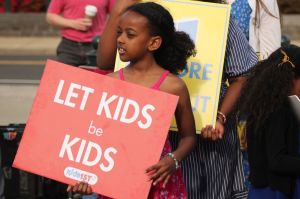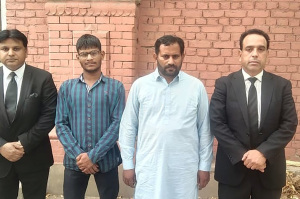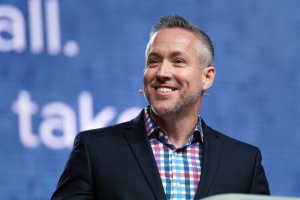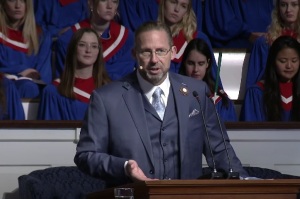Harvard Professor Robert Putnam on Rich/Poor Opportunity Gap: Kids Need Two Parents, Churches Can Do More Than Government (CP Interview 2/2)
CP: What if we did have a scenario where all the large, major religious groups in the country, Southern Baptists, United Methodists, etc., were to say, "We're going to make this a major focus of what we're going to work on?"
Putnam: It depends on what you mean by "this." Remember, I have a slightly different overall impression of the problem than Brad [Wilcox]. I think family structure is really important. But I also don't think that's all that's important. I think the rest of us too. Not just the parents of the kids, the rest of us, too, have a major role to play here, especially in providing mentoring and guidance to kids.
So, I'd be delighted if the churches and religious groups in America would take on the problem of this opportunity gap. As I said to other people, I think that, if the major faith groups in America took on the question of the opportunity gap as a major priority, not just the question of marriage but also the question of how we can help these poor kids, I think that would go a long way to fixing the problem, frankly.
And on the contrary, if the major religious groups in America don't take on the problem, I think it's going to be really hard to address the problem. When I say address the problem, I mean, partly, by not only restoring the norm of marriage. The churches have focused on that but they haven't focused nearly as much on the issue of, we have a lot of these poor kids out there who are really alone and a generation ago churches would have been involved in the lives of these kids.
You can see that in the stories that I tell. A working class kid from my own hometown, Port Clinton, Ohio, a man who is called Don in the book, he went to college because a pastor in town was paying attention to him and helped him figure out how to get off to college. Don's family was not the problem. His parents were married and they were both church goers, but they knew nothing about how to get to college, and the pastor stepped in and helped him get to a university and Don is now recently retired, himself, as a pastor.
Religious communities are really important. I've written a whole book about how important religious communities are, as a source of social support. I think the fact that working class people and working class kids have fallen away from religious communities is really unfortunate. So, I think there is a major role for churches to play, and not just with respect to family structure and marriage, but also with respect to helping these kids. They are desperately alone, these kids are.
Let me give you a different example to convey this point. All kids get in trouble. Your kids get in trouble. My kids get in trouble. Rich kids, poor kids, black kids, white kids, all kids get in trouble, that's the nature of kids. But when kids are growing up in more affluent homes, a kid gets involved in drugs or alcohol or teen sex, back into someone's car, all the things kids get involved in, when that happens to a kid from an affluent home, airbags inflate instantly and help protect kids from the consequences of the error, help them learn from the experience. And in the lives of poor kids there are no airbags because they are so isolated from social institutions, not just their parents but from social institutions. That means that when a poor kid gets in a scrape, they're alone because they lack caring adults in their lives.
Once upon a time, churches played a really important role in the lives of working class Americans. I would hope that churches might get more involved that way, not only in providing direct services, although that is important (I've written about the role that churches, even today, play in providing social services) but also in calling on government to pay attention to the needs of poor kids.
CP: One area you write a lot about is education. And, certainly, Americans expect our education system to provide equality of opportunity. You don't mention in your proposed reforms school choice, an idea championed by many conservatives. Rich kids, of course, already have school choice because they can afford private school. Why not give poor and middle class families the same choice by providing vouchers that can be used at any public or private school?
Putnam: It's not that I'm opposed to choice, it's just that the evidence is that it doesn't have the effect of closing the opportunity gap. I don't have an ideological opposition. By now we know what all the evidence says, and the evidence says that choice and charter schools, in themselves, do not narrow the opportunity gap. And the reason is that rich kids are more likely to take advantage of choice than poor kids are, because the poor kids parents are just not in a position to make the kinds of choices that rich kids parents are.
My opposition is not to choice, per se, but to say the evidence shows that choice does not, itself, close the opportunity gap. The basic reason is that affluent parents are much more likely to be able to really understand which are really good schools and which are not, and poor parents just lack that savvy that will enable them to make effective use of choice. It's not an ideological question for me, it's a practical question — what do the results say?
CP: There is a way to combine the choice proposal with what you're talking about. You say that the poor schools need more resources because it's harder to educate a poor kid.
Putnam: That's right.
CP: So, you could have a voucher system in which the voucher is worth more. Because the school needs more resources to educate the poor kid, you give them more money to educate the poor kid.
Putnam: That might work. It would also work if it was just an ordinary public school. All the evidence shows that poor kids are much more likely to go to neighborhood schools, schools close to home, than rich kids are, because transportation is just easier for rich kids than poor kids.
I repeat, my argument is not against vouchers, my argument is anything that works to help poor kids and what would clearly help poor kids is if we had more resources that were targeted at bringing better teachers to poorer schools. I'm in favor of anything that would bring better teachers to low-income schools.





























